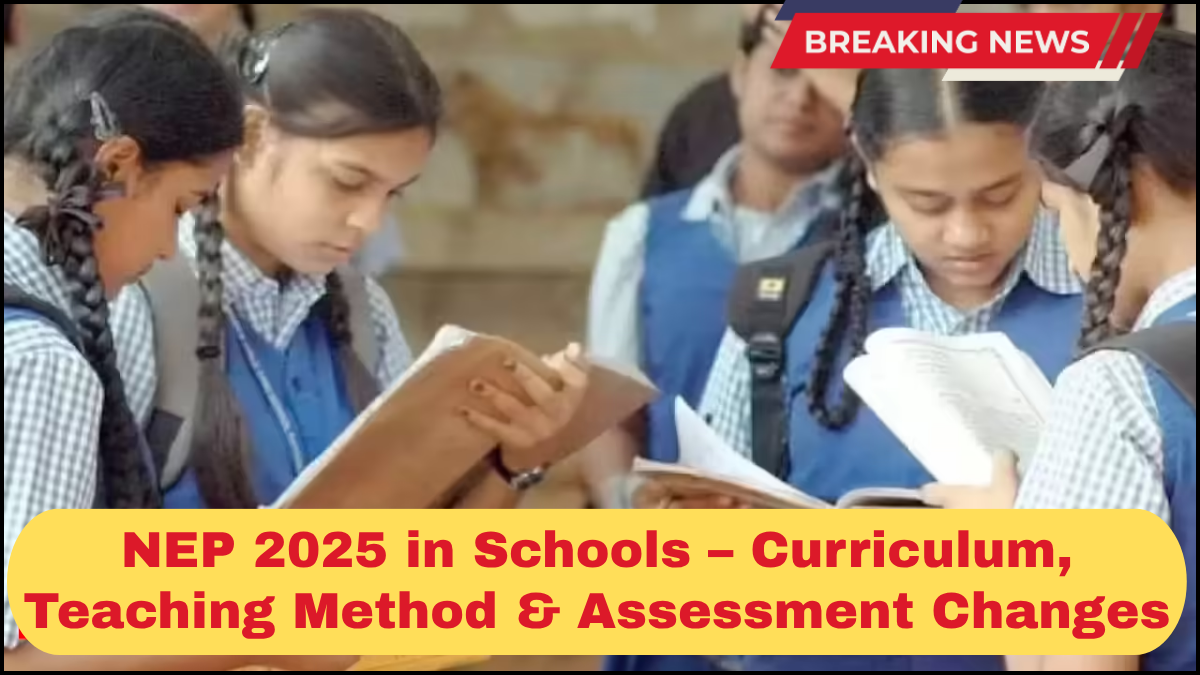The National Education Policy (NEP) 2025 brings a transformative shift in India’s schooling system. Designed to address the changing needs of the 21st-century learner, this policy is not just an update but a full-scale reimagining of how education should function in Indian schools.
This article outlines the core changes under NEP implementation in schools, especially in curriculum structure, pedagogy, and student assessments. These updates aim to move away from rote learning and usher in a more holistic, flexible, and learner-centric approach.

Curriculum Reforms in NEP 2025
One of the most significant aspects of NEP 2025 implementation in schools is the complete overhaul of the existing curriculum framework. The focus has shifted from content-heavy syllabi to a competency-based model that nurtures critical thinking, creativity, and real-world application.
Key Changes in Curriculum:
- 5+3+3+4 Structure: The traditional 10+2 format is replaced by a new structure aligning more closely with cognitive development stages. It covers Foundational (ages 3-8), Preparatory (8-11), Middle (11-14), and Secondary (14-18) stages.
- Interdisciplinary Learning: Subjects are no longer taught in isolation. For instance, mathematics might be linked with real-life financial literacy or coding, while language studies could incorporate storytelling and media literacy.
- Reduced Content Load: The curriculum is being pruned to emphasize core concepts, allowing for deeper understanding rather than surface-level memorization.
- Inclusion of Contemporary Topics: Areas such as environmental awareness, digital literacy, AI, and entrepreneurship are now core components, preparing students for modern challenges.
These curriculum reforms aim to make learning more relevant, flexible, and responsive to students’ interests and societal needs.
Teaching Methods: A Shift Toward Experiential Learning
Traditional chalk-and-talk methods are giving way to active, student-centered pedagogy. Teachers are being trained to become facilitators of learning rather than mere transmitters of information.
Innovations in Teaching Approaches:
- Experiential Learning: Classrooms are becoming interactive zones. Activities such as group projects, field trips, role-plays, and simulations help internalize concepts more effectively.
- Multilingual Education: In early grades, instruction in the mother tongue or regional language is encouraged to strengthen comprehension and learning outcomes.
- Tech-Integrated Classrooms: Smart boards, educational software, and AI-based learning apps are becoming regular features in schools, allowing personalized instruction.
- Continuous Teacher Training: Professional development is emphasized through modular, online training platforms to keep educators aligned with evolving pedagogical standards.
The NEP 2025 doesn’t just modernize what is taught; it transforms how it is taught, encouraging engagement over enforcement.
Assessment Changes: From Exams to Competency Checks
Assessments under NEP 2025 are being redesigned to eliminate high-stakes, memory-based testing. The focus is now on evaluating understanding, skills, and application rather than regurgitation.
Major Assessment Reforms:
- Formative over Summative: Schools are encouraged to adopt continuous, formative assessments that guide learning rather than judge it.
- 360° Holistic Report Card: Instead of just marks, students receive feedback on cognitive, social, emotional, and physical development.
- Standardized Testing at Key Stages: National Achievement Surveys (NAS) and State-level benchmarking will ensure quality without burdening the child.
- Self and Peer Assessments: Students are involved in evaluating their own and their peers’ work, promoting responsibility and reflection.
These changes aim to reduce exam stress and nurture a growth mindset among learners.
The Road Ahead for NEP Implementation in Schools
Successful NEP implementation in schools will require coordinated efforts across governments, school managements, educators, and parents. Investment in teacher training, curriculum design, and infrastructure is essential to support this overhaul.
Many schools, particularly in rural and under-resourced areas, may face challenges such as lack of digital infrastructure and training. However, the policy is flexible and allows phased implementation, giving states the leeway to adapt based on local realities.
Frequently Asked Questions (FAQ)
Q1: What is the NEP 2025 in the context of schools?
A: NEP 2025 refers to the updated National Education Policy focused on transforming Indian school education through curriculum reforms, modern teaching methods, and holistic assessment models.
Q2: How is the curriculum changing under NEP 2025?
A: It emphasizes interdisciplinary learning, reduced syllabus content, and the inclusion of modern skills like AI, digital literacy, and environmental studies.
Q3: Will exams be removed under NEP 2025?
A: Not completely. The focus is shifting to formative assessments and concept-based evaluations rather than memory-based high-stakes exams.
Q4: How does NEP 2025 affect teachers?
A: Teachers will receive continuous training and support to adopt new pedagogical techniques and use digital tools effectively.
Q5: Is NEP 2025 already implemented in all schools?
A: Implementation is ongoing and phased. Some elements are already in place, while others are being rolled out over time, depending on state readiness.